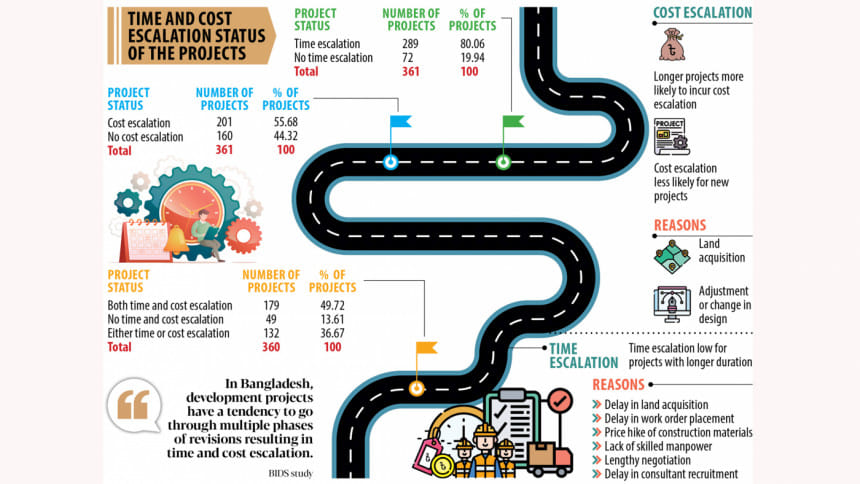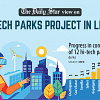1 Month extension raises project cost by 0.95 percentage points: study

A one-month extension in duration leads to a 0.95 percentage-point spike in costs during the implementation of development projects, according to a study of the Bangladesh Institute of Development Studies (BIDS).
The findings gave an idea how much could be saved if delays are avoided in a country where Tk 246,066 crore has been allocated for the current financial year to implement development projects under the Annual Development Programme (ADP).
The development budget accounts for 5.5 per cent of the country's gross domestic product of $460 billion.
The autonomous research think-tank studied 361 projects implemented by the Roads & Highways Department from 2012-13 to 2021-22 and audited by the Implementation Monitoring Evaluation Division (IMED).
The transport and communications sector constituted 28.7 per cent of the ADP allocation in 2022-23, up from 24.7 per cent a year ago. The allocation was at least 23 per cent in the past one decade.
The BIDS study found that the projects saw a 26 per cent increase in cost on average, while 96 per cent saw time overrun, said Jayed Bin Sattar, a co-researcher of the study, while making a presentation at the BIDS Research Almanac 2023 at the Lakeshore Hotel in Dhaka yesterday.
The study was led by BIDS Senior Research Fellow Kazi Iqbal and the team included Taibur Rahman, a former director of the IMED, and currently joint secretary at the post and telecommunication ministry.
In Bangladesh, development projects have a tendency to go through multiple phases of revisions, resulting in time and cost over-run.
The average number of revisions is 1.10 for all projects, 1.12 for larger projects and 1.09 for smaller projects, according to the study.
Of the projects reviewed, 55.68 per cent witnessed cost escalation and 80.06 per cent saw time extension.
While making the presentation at a session on "Time & Cost Overrun in Development Projects: Evidence from Audit Reports of Roads Projects" on the concluding day of the two-day event, Sattar, a research associate of the BIDS, said both time and cost escalation of the projects were around 50 per cent.
"The cost and time overrun ultimately increase welfare loss."
In the case of projects financed through borrowing, longer implementation periods have high rates of interest and add to more repayment schedules. Even too much delay can make projects irrelevant, said the study.
The study found that cost escalation was less likely for relatively new projects while longer projects are more likely to incur cost escalation.
The study blamed the insufficient allocation of budget against the actual work plan, the change in the scope of work, and the delay in land acquisition and tender processing for the time over-run.
The delay in land acquisition and adjustment and change in designs were found to be responsible for the significant rise in costs.
"Land acquisition issues are mostly responsible both for time and cost escalation. So, without any reform in the existing system and practice of land acquisition, it would be difficult to solve the time and cost overrun in development projects," said the BIDS study report.
The reasons for the delay in completing other infrastructure projects could be similar to those faced by the projects implemented by the Roads & Highways Department, Sattar told The Daily Star.
Enamul Haque, a professor of the Department of Economics at East West University, chaired the session while Azreen Karim, a research fellow of the BIDS, and Mohammad Golam Nabi Mozumder, also a research fellow, made separate presentations.

 For all latest news, follow The Daily Star's Google News channel.
For all latest news, follow The Daily Star's Google News channel. 








Comments